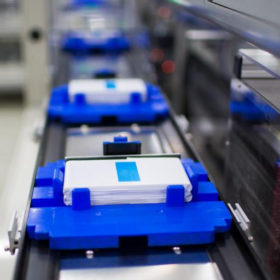
The centralized nature of policymaking in Beijing would enable component standardization to ease the transition from EV to stationary energy storage use, according to Greenpeace East Asia.
Environmental NGO Greenpeace has said China's leaders must put the repurposing of electric vehicle (EV) batteries at the heart of plans to be carbon neutral by 2060.
The East Asian branch of the charity has calculated 12.85 million tons of lithium-ion batteries will no longer be useful for e-mobility in China during the next decade. Repurposing those devices for energy storage use, rather than manufacturing new batteries, would save 63.34 million tons of carbon emissions, Greenpeace East Asia said this morning.
Chinese president Xi Jinping made headlines around the world in September when he pledged, during a speech at the UN, the nation would achieve a net-zero carbon economy by 2060. Few details of how such a turnaround would be achieved have emerged, and China watchers expect the country's 14th five-year plan – due to take effect from January 1 – to include policy geared towards the emissions reduction ambition.
Tidal wave
“We’re about to see a tidal wave of old EV batteries hit China,” said Greenpeace East Asia senior program manager Ada Kong. “How the government responds will have huge ramifications for Xi Jinping’s 2060 carbon neutral commitment. State policy indicates EVs will play a central role in emissions reduction and Beijing needs to account for the high emissions of EV manufacturing. What we do with this wave of old batteries is actually a billion dollar, billion-ton-of-carbon-dioxide question.”
The use of repurposed EV batteries for stationary storage could benefit 5G communications infrastructure and data centers, two areas which – along with EVs and energy storage – are subject to core state policies drawn up in Beijing. The centralized nature of government in China would ensure the standardization of components required to ease the transition of devices from EV to stationary use could be achieved, Greenpeace East Asia pointed out.
China also hosts half of the world's biggest EV battery manufacturers: CATL, BYD and Guoxuan High-Tech, the NGO added. Together with South Korean producers LG Chem and Samsung, and Japanese giant Panasonic, the ‘big six' account for the manufacture of around 72% of the world's electric vehicle batteries. With the three East Asian nations producing 85% of the world's EV batteries, Greenpeace said, repurposing end-of-life e-mobility products could avoid a supply crunch of raw materials such as lithium, cobalt, nickel, and manganese.
“Repurposing is central to manufacturers’ responsibility to mitigate their carbon emissions,” said Kong. “High consumption and throwaway economies caused climate change and resource exploitation. To make EVs a sustainable solution, battery manufacturers and automotive companies have a social responsibility to support circular economies. And governments have a responsibility to mandate recycling and repurposing systems for EV batteries.”
The charity called for policies from Beijing to drive battery tracking and collection and for product design to enshrine principles of standardization and recyclability.
Circular manufacturing
Circular manufacturing was the focus of pv magazine‘s UP initiative during the last quarter. We considered whether adopting a circular approach could create a competitive edge and reap financial and reputational rewards. We also investigated what is already being done in the solar industry. Browse our coverage here.
Lắp đặt điện mặt trời Khải Minh Tech
https://ift.tt/2X7bF6x
0906633505
info.khaiminhtech@gmail.com
80/39 Trần Quang Diệu, Phường 14, Quận 3
Lắp đặt điện mặt trời Khải Minh Tech
https://ift.tt/2ZH4TRU
Không có nhận xét nào:
Đăng nhận xét